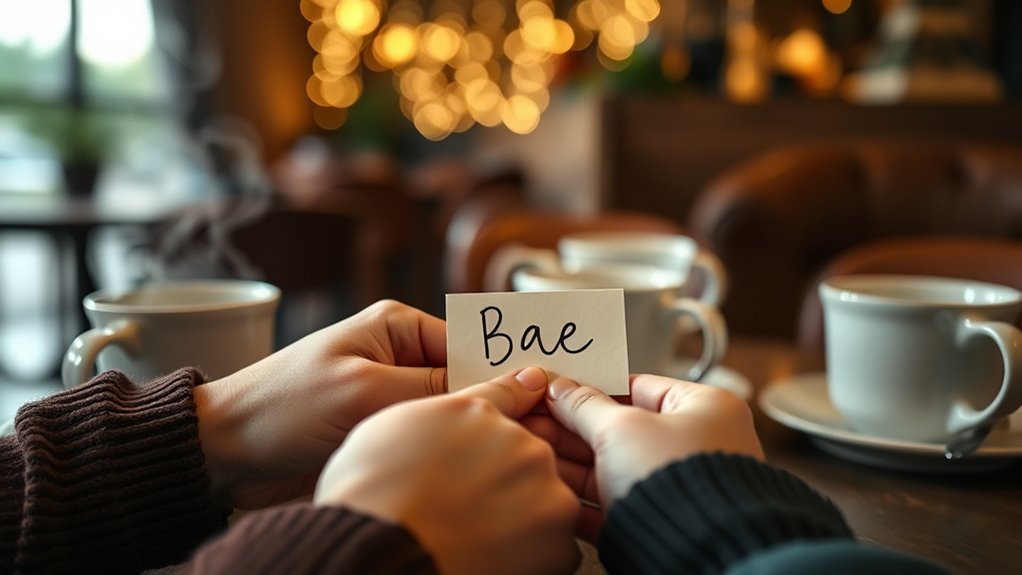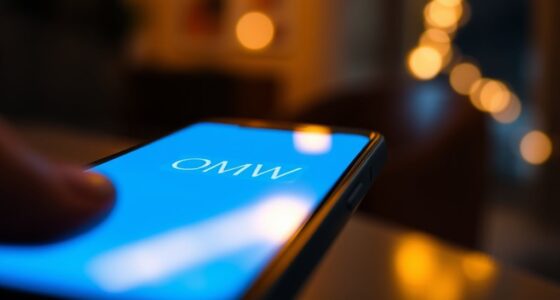In slang, BAE stands for “Before Anyone Else” and is commonly used to refer to a romantic partner or someone you care about deeply. It started as a term of endearment that’s gained popularity through social media, music, and pop culture. People often use it to show affection or highlight someone’s importance in their life. To understand how this term became so popular and its many uses, keep exploring the story behind BAE.
Key Takeaways
- BAE stands for “Before Anyone Else,” emphasizing someone’s importance or priority in your life.
- It is a slang term of endearment used for romantic partners, friends, or oneself.
- BAE is commonly used in social media, texting, and pop culture to express affection or admiration.
- The term has evolved from a literal acronym to a versatile symbol of closeness and love.
- It is often accompanied by emojis and informal language to enhance emotional expression online.
The Origins of BAE in Popular Culture

The term “BAE” gained widespread popularity in recent years, but its origins in popular culture trace back to social media and music. Its slang evolution reflects how cultural influences shape language, especially among younger generations. Initially, “BAE” emerged on platforms like Twitter and Tumblr, where users started using it as a term of endearment. Musical artists also played a role, with rappers and singers incorporating “BAE” into lyrics, which helped it spread rapidly. Over time, “BAE” became a shorthand for someone you care about deeply, influenced by the blend of social media trends and pop culture. This convergence of cultural influences transformed “BAE” from a niche slang term into a mainstream expression of affection. Additionally, digital literacy played a role in how quickly such slang terms are adopted and disseminated across online communities.
The True Meaning Behind BAE

Have you ever wondered what “BAE” truly means beyond its social media popularity? In romantic slang, BAE is a term of endearment for someone you care about deeply. It’s often used in digital communication to express affection toward a partner or someone special. At its core, BAE stands for “Before Anyone Else,” emphasizing prioritization and exclusive affection. This simple phrase captures the essence of emotional closeness you feel in digital conversations. Here’s a quick breakdown:
| Acronym | Meaning | Usage Context |
|---|---|---|
| BAE | Before Anyone Else | Romantic slang for loved ones |
| Digital communication | Texts, social media | Expressing affection |
| Romantic slang | Endearing terms | Intimate conversations |
| Prioritization | Putting someone first | Emotional connection |
| Expressiveness | Showing love openly | Modern dating culture |
Understanding the vibrational energy behind words like BAE can deepen your appreciation of how language influences emotional bonds. This small phrase packs a lot of emotional significance in today’s digital age.
How BAE Became a Term of Endearment
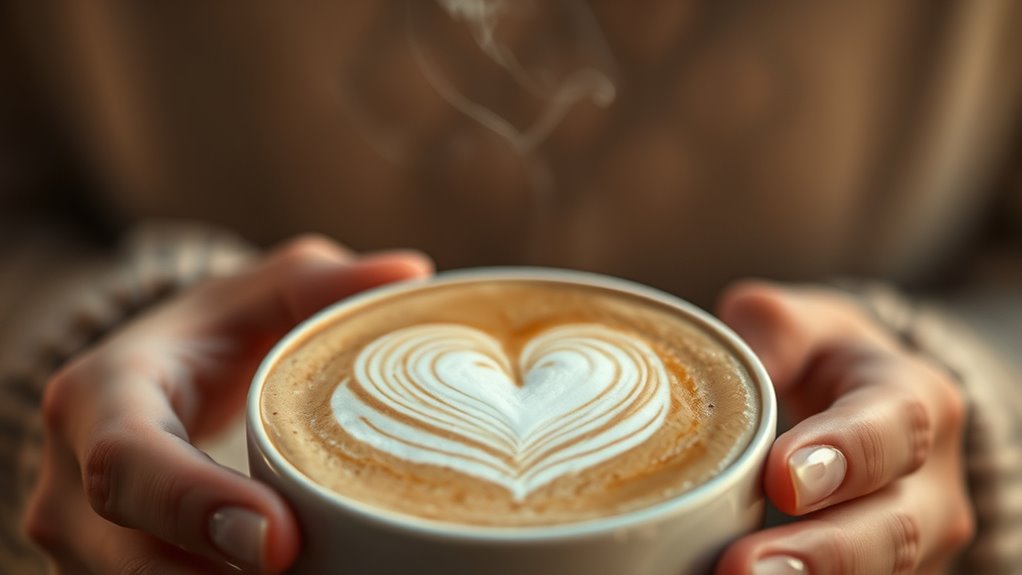
You’ve probably noticed BAE being used as a term of endearment, but how did it get there? It started in romantic slang, gaining popularity through social media and pop culture. Over time, it shifted from a simple acronym to a sweet way to refer to someone you care about. Interestingly, the emotional impact of language like this can be enhanced by understanding trailer music techniques, which emphasize building tension and emotional resonance.
Origin in Romantic Slang
Ever wonder how “bae” transformed from a simple slang acronym into a beloved term of endearment? It all started within romantic slang, where language constantly evolves to express affection creatively. Originally short for “before anyone else,” “bae” was used to refer to someone special, emphasizing their importance. Over time, this linguistic evolution allowed it to shed its literal meaning and become a shorthand for a partner or loved one. Its catchy, easy-to-say sound helped it gain popularity among young people, spreading quickly across social circles. As a term of endearment, “bae” became more than just an acronym; it became a symbol of closeness and affection, solidifying its place in romantic slang and everyday language. Additionally, linguistic evolution played a key role in how the term grew beyond its original context.
Popularization Through Media
The rise of social media and popular culture played a crucial role in turning “bae” into a widespread term of endearment. Media influence, especially through platforms like Instagram and Twitter, helped normalize its usage. When celebrities adopted “bae” in their posts and interviews, it gained even more traction, reaching audiences worldwide. Their frequent usage made the term feel relatable and affectionate, encouraging fans to adopt it themselves. Popular media often showcased couples using “bae” as a sweet nickname, reinforcing its romantic connotation. As a result, “bae” transcended its original slang roots and became a common term people use to refer to someone they care about deeply. This media-driven exposure accelerated its acceptance as a term of endearment across different age groups. Additionally, the popularity of internet slang contributed to its widespread adoption beyond social media, making it a part of everyday language.
Shift to Endearment Use
As media exposure made “bae” a familiar term, its use shifted from a casual slang word to an affectionate nickname. You started to see it used as a term of endearment, especially in romantic contexts. This change happened because people began adopting “bae” as a romantic nickname, making it a quick way to show affection. Here are three reasons why it became an endearing term:
- It simplifies romantic nicknames, making them more playful and personal.
- It spreads easily through social media, reinforcing its role as an affectionate term.
- It feels intimate yet casual, perfect for expressing love without overdoing it.
- Its popularity grew as it was incorporated into everyday language, further solidifying its status as an endearing expression.
Now, “bae” is widely recognized as a warm, affectionate way to refer to someone special.
Different Contexts and Uses of BAE

Have you noticed how people use BAE in various ways beyond just referring to a romantic partner? This reflects the slang evolution, where terms often expand their meanings over time. BAE now appears in different contexts, like calling a friend “my BAE” or describing something cool or impressive as “that’s BAE.” Its cultural influence stretches across social media, music, and everyday conversations, making it a versatile slang term. You might see BAE used to express admiration, affection, or even excitement about an object or experience. This adaptability shows how slang evolves to fit different social settings, allowing people to communicate feelings quickly and creatively. The meaning and usage of slang terms continue to evolve, highlighting how language adapts to modern communication styles. Understanding these diverse uses helps you see how BAE has become more than just a term for a romantic partner.
Common Mistakes and Misunderstandings
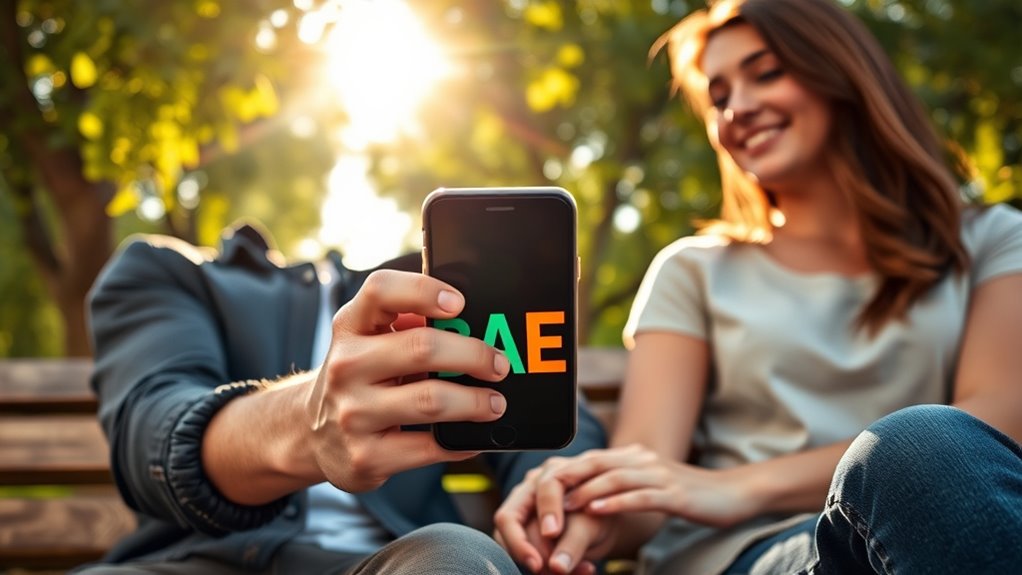
While BAE has become a flexible slang term used in many contexts, people often make mistakes by assuming its meaning is always romantic. This misinterpretation of bae can lead to confusion, especially when someone uses it casually or platonically. To avoid slang confusion, recognize that bae can refer to friends, family, or even yourself, not just a romantic partner. Here are common mistakes to watch out for:
- Assuming BAE always means romantic interest
- Using BAE in formal or professional settings
- Misunderstanding BAE as simply “before anyone else” without context
- Failing to consider the cultural and contextual nuances in how slang terms like bae are used.
Understanding these nuances helps you use BAE correctly and prevents misunderstandings in conversations. Remember, context is key to accurately interpreting and applying slang like bae.
The Future of the Term in Digital Communication
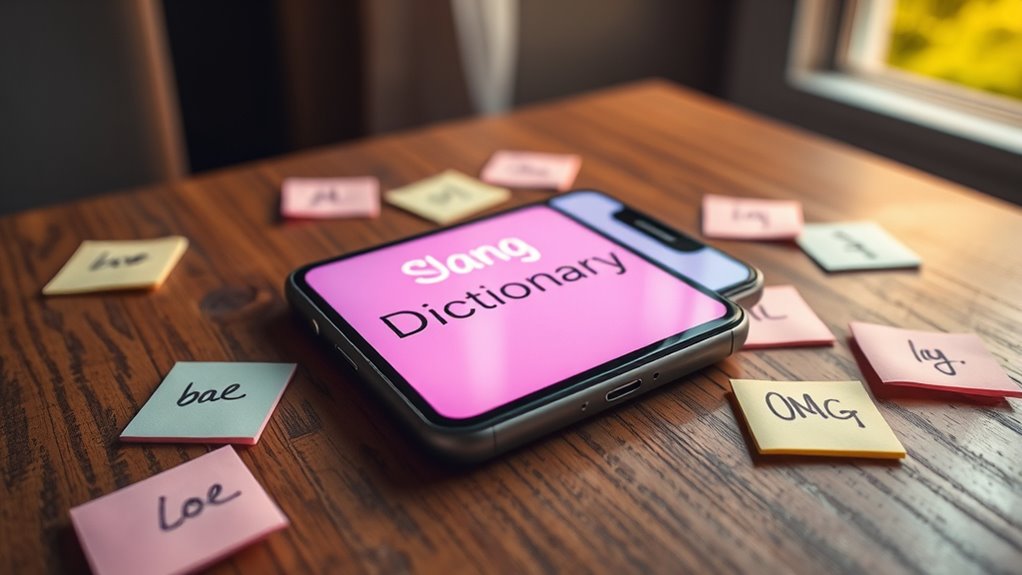
As digital communication continues to evolve, terms like BAE will likely shift in meaning or usage. You might notice new slang emerging that changes how people express affection or connection online. Staying aware of these trends helps you understand and adapt to the changing language landscape, especially as internet slang continues to develop in innovative ways.
Evolving Digital Romance
Ever wonder how slang like “bae” continues to shape digital romance? As digital dating evolves, slang adapts to new ways couples connect. In the future, you’ll see more emoji expressions replacing words, making conversations more visual and personal. This shift helps convey emotions quickly in busy chats, keeping relationships lively. Here’s what to expect:
- Increased use of emoji expressions to show affection and playfulness.
- Shortened, more casual language to match fast-paced digital dating scenarios.
- New slang terms emerging alongside “bae” to reflect evolving relationship dynamics.
- As trends in communication evolve, understanding digital language becomes essential for meaningful connections.
These changes make digital romance more immediate and expressive, allowing you to connect more authentically in a digital world. The future of slang in online love feels vibrant and innovative.
New Language Trends
Have you noticed how digital communication keeps evolving with new slang and expressions? The slang evolution reflects ongoing language innovation, shaping how we connect online. As trends shift, terms like BAE may fade or transform, influenced by younger generations and social media platforms. Future slang will likely become more concise and inventive, blending humor, emojis, and abbreviations to express ideas quickly. You’ll see new words emerge rapidly, riding waves of popular culture and technology. This constant language evolution keeps digital conversations fresh and dynamic, challenging traditional grammar and vocabulary. Staying updated means observing how slang adapts to new communication styles. The future of slang lies in its ability to mirror current social trends, making digital language a living, breathing form of expression that evolves with you. Additionally, understanding language evolution helps us appreciate how slang adapts to technological and cultural changes over time.
Frequently Asked Questions
Is BAE Used Exclusively for Romantic Partners?
No, bae isn’t used exclusively for romantic partners. You can use it in casual language to refer to friends, family, or even pets you care about deeply. It’s a term of endearment rooted in romantic terminology but has expanded in popularity, so you might say “my bae” for someone important in your life, regardless of romantic involvement. Just remember, context helps determine if it’s romantic or platonic.
How Has BAE Influenced Modern Slang?
You’ll notice that “bae” has become a staple in romantic slang, with over 60% of teens using it, reflecting its cultural influence. It’s transformed how people express affection, making language more casual and playful. Bae’s popularity has inspired countless variations and new terms, shaping modern slang beyond just romance. This term’s widespread use highlights how slang evolves quickly and influences everyday conversations across social media and pop culture.
Can BAE Be Used in Professional Communication?
You shouldn’t use “bae” in professional communication, as it’s informal slang and not appropriate for formal settings. Instead, opt for formal alternatives like “partner,” “colleague,” or “client,” depending on the context. Using “bae” can undermine your professionalism and professionalism’s importance. To maintain professional appropriateness, stick to clear, respectful language that aligns with workplace standards and respects the tone expected in business interactions.
Are There Regional Differences in BAE Usage?
You’ll notice regional slang variations influence how often people use “bae,” with some areas adopting it more rapidly due to cultural adoption trends. In urban centers or areas with diverse populations, you might hear “bae” more casually or frequently, while others use it less or not at all. These differences reflect local language evolution and the spread of slang through social media, making “bae” a dynamic term that varies regionally.
Has the Meaning of BAE Evolved Over Time?
You’ve probably noticed that the meaning of bae has evolved, reflecting the evolution of romantic language and cultural shifts in slang. It started as a simple abbreviation for “before anyone else,” but now, it’s often used for anyone you care about deeply, even friends. Ironically, what once meant exclusivity now broadly applies, showing how slang adapts to our changing relationships and social dynamics.
Conclusion
Understanding what bae truly means helps you see beyond the slang, like unwrapping a gift to find genuine connection. As language evolves, so does its meaning—reminding you that words are bridges, not barriers. Embrace the term’s journey from cultural origins to endearing expression, knowing it’s more than just a trend. In the end, bae reflects the love and familiarity we share, echoing through every text, tweet, and heartbeat—an enduring symbol of affection in a digital age.
